CHINA'S ENGINEERING PROWESS has been nothing short of extraordinary. From world-class infrastructure and eco-friendly cities to space systems and high-speed trains, China's impressive accumulation of state-of-the-art physical capital has played a dominant role in driving its economy. But China's physical engineering accomplishments on the supply side have not been transferable to social engineering efforts on the demand side, especially in stimulating consumer demand.
The disconnect arises out of the modern Chinese political system, which emphasizes stability and control. While this focus has enabled the country to become the world's "ultimate producer", it has not been successful in uncovering the DNA of the Chinese consumer. Social engineering through government diktat stands in sharp contrast to the incentive-based, free-wheeling, individualistic spirit that shapes human behavior and consumption patterns in the West. With the household consumption share of Chinese GDP remaining below 40%, compared to around 65% in advanced economies, China has little to show for its long-standing rhetoric on consumer-led rebalancing.
The American experience, as famously documented in John Kenneth Galbraith's The Affluent Society, decodes the DNA of a consumer society. Key characteristics include upward mobility of income and wealth, open communication and dissemination of information, individualism and freedom of choice, diminished inequality of lifestyles, intergenerational wealth transfers, and, ultimately, the ability to elect political representatives. Western consumerism is very much an aspirational proposition.
This story is from the December 24, 2024 edition of Financial Express Mumbai.
Start your 7-day Magzter GOLD free trial to access thousands of curated premium stories, and 9,000+ magazines and newspapers.
Already a subscriber ? Sign In
This story is from the December 24, 2024 edition of Financial Express Mumbai.
Start your 7-day Magzter GOLD free trial to access thousands of curated premium stories, and 9,000+ magazines and newspapers.
Already a subscriber? Sign In

Microsoft to spend $80 billion on AI data centers this year
MICROSOFT CORP PLANS to spend $80 billion this fiscal year building out data centers, underscoring the intense capital requirements of artificial intelligence.
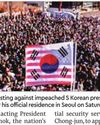
S Korea investigators ask acting prez to clear way for Yoon's arrest
SOUTH KOREAN INVESTIGATORS again asked the country's acting president on Saturday to order the presidential security service to comply with an arrest warrant for impeached President Yoon Suk Yeol.
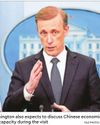
Chinese Dam on Table for Sullivan's India Visit
AI, civilian nuclear cooperation, space may also be taken up

Mike Johnson Re-elected US House Speaker
Republican Congressman Mike Johnson on Friday was re-elected as Speaker of the US House of Representatives with a narrow victory margin of three votes.
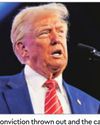
No jail time for Trump, suggests judge in US hush money case
Will keep fighting, says communications director Cheung

Border-Gavaskar Trophy: As Bumrah leaves, 'captain' Kohli calls the shots
Kohli took charge after Bumrah left bowling due to spasm

Rohit clears the air: Not going anywhere
Says those on outside can't influence when he stops playing
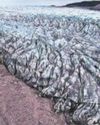
Worrying signs from the Arctic
Scientists say fires in the region could have major consequences
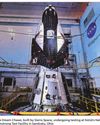
Big rockets, a telescope & big changes in space await in 2025
Some key events to look forward to in space & astronomy
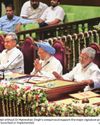
Dr Manmohan Singh, RIP
The present generation (born after 1991) scarcely believes that there was an India with one television channel, one car, one airline, one telephone service provider, trunk calls, PCO/STD/ISD booths and long waiting lists for everything from two-wheelers to train tickets to passports. The seeds of change were sowed by Dr Singh, a fact belatedly acknowledged by Prime Minister Modi's tribute to him and the Cabinet resolution.